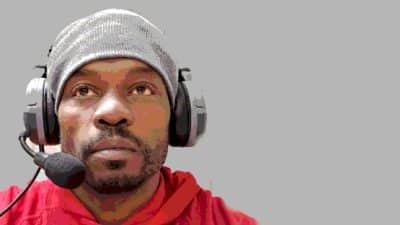
THE MODERATOR: We will have Coach Mendenhall make an opening statement and then take questions for the student-athletes.
COACH MENDENHALL: It’s a pleasure to be here representing the University of Virginia. I’m still getting used to saying that after 13 years at Brigham Young University. I’m excited, thrilled and encouraged after what I’ve seen so far. I like my team a lot. I like their work ethic, I like their diligence, their toughness. Holy cow, we’ve asked a lot of them.
For those that haven’t seen us practice, maybe those are just words to you right now. They’re handling a work capacity in a very short time that I didn’t think they’d be able to handle.
Two of my leaders are with me. I couldn’t think of two better representatives than our center Jackson Matteo and our middle linebacker Micah Kiser. I selected them to come, and I chose them not only because of how they play the game, but I like them by how they work and I like who they are. I like the toughness and resolve that they have in terms of leading our team.
I would say at the University of Virginia, we’re ahead of schedule in terms of the culture, with the execution to follow. We’ll be working hard this fall camp to make sure, for the players that earn the right to come into fall camp with their conditioning, that they’re ready and fit. But we have some football work to do.
We are a football program that bases will before skill. We work from the inside out. Eventually we’ll play good football. But we work on toughness and effort. We’ve made significant inroads in that regard. We think the football will catch up and catch up relatively quickly.
I love my coaching staff, 14 members now, and families followed me across the country from the state of Utah. I only work with people that I like and I trust. So an entire group of people came across country to do that. I think our players love them, by their energy and enthusiasm. I certainly love them.
We have a lot to be optimistic about and hopeful about in terms of the University of Virginia’s future.
Thank you.
THE MODERATOR: We’ll bring Jackson up for questions.
Q. Could you talk about how the summer has differed or been similar to past years?
JACKSON MATTEO: Absolutely. This summer differs in a lot of ways from the past summers that I’ve had at the University of Virginia. Just starting off, everything is earned, not given. You hear coach ‘earned, not given.’ You wonder what that means.
I’ll tell you. Our workout gear is black and gray. No V-Sabres. You have to earn them. Back in the spring, we had to earn our way into the weight room and onto the field because playing football is a privilege. People don’t realize that until you have everything stripped from you.
This summer has been another testament to that. We have to earn our way onto the field every day. If our warmup isn’t perfect, why would you be able to workout if you’re not warming up to the best of your ability.
Once we are finished with our work outside, then we will go inside. If our work outside is not perfect, why would you go inside to workout? Why would you go inside the weight room if you haven’t done everything you could outside? That’s how it’s different.
Thank you for the question.
Q. How would you describe the culture that coach is trying to institute there with you guys there?
JACKSON MATTEO: That’s a great answer. I have three answers. First is ‘Earn not given’; the second is ‘Will before skill.’ I think you’ve heard coaches say, I’ll take a guy who tries hard over a guy who is better, then they’ll go back on their word. No, that’s not what’s happening at Virginia.
If you try harder, you will be on the field. It’s will before skill. Everything is earned and not given. The third thing is, ‘There’s two ways to do something, it’s the right way and it’s again.’ They mean it.
Those are just three building blocks that are going to change the culture of the University of Virginia and the football program ultimately, so…
Q. Looking at anchoring this offensive line, what can you say about the talent around you heading into this season under your new coach?
JACKSON MATTEO: Specifically offensive line or talent in general?
Q. Offensive line.
JACKSON MATTEO: Yeah, our offensive line, we return a few starters, and we return some guys who have played, have experience. Eric Smith I think has started 32 games at right tackle and left tackle. Michael Mooney started ’15. He was out last year with a little knee injury. He’s back, and healthy.
We have a few guys inside. Jack McDonald, that’s a name you’re going to hear. Myself at center. We’re kind of looking around for the right guard spot. I think we have a good group of guys.
To go along with the past question, the way our culture has changed with the team directly reflects how the offensive line has been building our relationships with each other, because you have to play as one quarter, you can’t play at five nickels. You have to be together in everything you do.
This summer has been a perfect testament how tight a group of guys can get and how well it’s going to translate onto the field. It’s going to be special. A lot of experience, athletic, big guys. It’s going to be pretty special.
Does that answer your question? Is that good?
Q. Your sophomore year, you break your foot. Your junior year you come back. 413 passing opportunities, you don’t allow a single sack. What does that say about you, to be able to recover in such fine fashion?
JACKSON MATTEO: Man, so I’m not one to talk myself up or anything like that. But I think that directly speaks to my work habits, the habits of success that I’ve created for myself. It was a long road back from breaking my foot. The surgery, the road to recovery, it was extensive and it was hard.
Man, I came to Virginia as a walk-on. I think that correlates directly to earned not given. I’ve had to earn everything I’ve gotten at the University of Virginia.
After I broke my foot, I realized that even more. I changed my life: eating, nutrition, working with our nutritionist, Randy Bird. I ended up losing 10% of my body fat over the last two years and adding 20 pounds of muscle. Getting the proper rest I need. Anything from hot Yoga, working on my flexibility, to getting weekly massages to try to enhance my chances of being successful. Just doing anything I can to put myself in the right position to be successful, that’s what I’ve been trying to do.
Q. Obviously with a new coach comes a new system. Where do you think you ended the season and how do you see it heading into fall, how much farther you guys have to go?
JACKSON MATTEO: It’s much different from what we’ve had in the past. Just as far as the offensive scheme goes, we’re running, we’re on the ball. Our offensive goal is to be on the ball every 20 seconds. It’s very different from what we’ve done in the past. Usually we line them up, put two backs in the backfield, try to run it down your throat. Now we’ll spread them out.
We can run, we can pass. Primarily we’re going to be on the ball quickly. It’s going to happen fast. We’re really going to be trying to run the ball down your throat. Once you try to stop that, we’re going to try to put it over your head. It’s a pretty good balance.
It’s very different from what I’ve ever done. But I think as an offensive unit, we have transitioned pretty well. We’ve embraced the challenge, so…
Q. What do you say to the so-called experts, the media, that will predict you to finish towards the bottom of the ACC’s coastal division?
JACKSON MATTEO: Man, I would say that’s why you play the game. No one knows anything. That’s why you play the game. That’s why you compete. That’s why you try to put yourself in the position to be successful and win football games.
All those ratings, those rankings, they’re nice. They look great on paper. At the end of the day you have to put your helmet on and go out and play the game. That’s what I would say to them.
Q. Matt Johns said during spring practice that nobody has quit on a team because you’re unified, and despite the record in past years, you’ve been pretty close. How much do you agree with the statement that a new approach is needed, but you have the ingredients needed to do great things?
JACKSON MATTEO: Just to start off, I think it’s extremely important to be unified. Over the past few years, you know, you look back at those teams, I can speak for a lot of people, we just didn’t have great relationships in that locker room. That’s completely different now. This is the tightest team I’ve ever been a part of. It speaks directly to what we’ve been going through the past few months with Coach Mendenhall and his staff.
It’s special what’s going on right now. Coach Mendenhall says this all the time. If you don’t embrace the ‘earn not given’ or ‘will before skill,’ there always is a second option. If it’s not for you, that’s okay. What we’re doing is hard, but doing hard things together will ultimately make you better at the end of the day. That’s what this team is all about.
So does that answer your question?
THE MODERATOR: Jackson, thank you.
JACKSON MATTEO: Thank you.
THE MODERATOR: Micah, your turn. We’ll take questions.
Q. Last year you and Quin Blanding becoming the only teammates to finish the regular season one and two in tackles. What was it about that combination last year and what allows you to be better this year?
MICAH KISER: Me and Quin are always locked in together. We kind of play on a string. I like to look behind me and see Quin, he likes to look in front of him and see me. We really play off of each other. We’re very competitive with each other. We’re both leaders on the defense. I’m going, Quin, you’re going to get 10 tackles, I’m going to get 11. We play off each other.
Ideally, I don’t think you want two players to have all those tackles. We want everyone else to be involved, be a little bit more efficient on defense. Hopefully we’ll just improve on that, and me and him will get better and better and we’ll have a great defense this year.
Q. You seem to have a lot of experience in the middle of your linebacking corps. Who do you want to step up this season?
MICAH KISER: Me and Zach, we’ve been together for a while. On the outside, I think you got a lot of young potential, a lot of great athletes. Malcolm Cook, he’s a great athlete. We do this catapult testing in practice. Malcolm Cook can run faster than any other player on the team. I think you’ll see a lot out of him. Chris Peace, Cory Jones, Matt Terrell, just a lot of young guys with untapped potential that will definitely prove it to you guys this year.
Q. What can you say about the energy that Bronco has brought? How have you seen the environment change?
MICAH KISER: We’ve never been challenged as much as we have with Coach Mendenhall. That really brings you together. Our tempo runs just to qualify for spring practice, you had a lot of guys that were dying trying to make them. I remember Coach So’oto would come up to us and just say, You guys will never have an opportunity to die together like this again.
When you think about it like that drastically, it’s kind of crazy, but it was tough. It was probably the most challenging thing a lot of us have done. When you can accomplish things like that together, it only brings you together and forms tighter bonds.
Coach Mendenhall challenging us on and off the field, having to have 100% attendance in the classroom, that’s unheard of in college football these days. Stuff like that, it only brings us together, forms tighter bonds. It will help us this year.
Q. Could you talk about how different this defense is from what you’ve been accustomed to.
MICAH KISER: I guess the most different thing is that it’s a 3-4 now instead of a 4-3. I mean, for me it’s not that much different. I’m still on the inside, playing in the middle. We still attack a lot. We’re not just going to sit back and let teams dictate stuff to us.
I will say that Coach Mendenhall, he holds the defense accountable a lot more. He doesn’t expect teams to run the ball the length of a blade of grass. When your coach is on you like that, you’re going to play harder. He’s going to make us try harder than we’ve ever tried. We’re going to have a great defense this year.
Q. What makes you think you’re going to exceed expectations this season, better than a lot of people think?
MICAH KISER: When I go out there to play, I know we’re trying to our 100% ability, 100% effort. Coach Mendenhall, he demands the most out of us and he refuses to lose. When your leader refuses to lose, the players and the soldiers on the field will refuse to lose as well.
THE MODERATOR: We’ll excuse our student-athletes and bring up Coach Mendenhall up for Q&A.
Q. Could you update us on your quarterback situation. Have you settled on one guy or will you go into fall camp with two or three competing for the job?
COACH MENDENHALL: We currently have three quarterbacks in contention that we will carry through fall camp before we make a decision.
Matt Johns is one of our quarterbacks, which I love his leadership and his poise and his experience.
Connor Brewer had a very good spring, much more efficient and effective than any of us expected. He was just grateful for a chance. But he made the most of it. He is in contention.
And a transfer from East Carolina in Kurt Benkert. We’re very intrigued by what we’ve seen from him with the upside that he has two years of eligibility. There is a nice bridge there that could be formed with the possibility of more experience.
I won’t know until fall camp is over. We’ll have to do a masterful job of orchestrating fall camp to distribute the repetitions enough to be clear enough as to who is the uncontested leader, which is usually one of the biggest challenges in a relatively tight timeframe.
Q. What can you say about inheriting a team that’s obviously gone through adversity? You have two guys saying they have bought in. What have you seen from the team that you walked in and saw a few months ago?
COACH MENDENHALL: I appreciate the question regarding indicators of buy-in from our team.
It’s been really rewarding to be here today and be able to sit in and listen to their interviews. They are authentic. They haven’t been asked or schooled to say anything specifically by me. It’s really been fun to listen to them. It’s really been fun to watch our team work.
Again, work to me is a literal term. Growing up, horse operation, what that entails. I remember my father sending me out, and a cousin. I think I was nine and my cousin was 11. He and my uncle pointed us to 40-acres of hay that had just been bailed and sent no one else out with us and told us to not to come back until it was done. That’s two kids with that expectation.
I learned really early on that people can accomplish much more than what they’ve been asked. Our team is doing what they’re asked to do. I’m pushing them really hard. With that comes the ownership and responsibility of myself, that what I’m asking them to do will work. They’re trusting me that it will.
They’re certainly doing their part to this point in terms of developing the work capacity. You cannot be neutral and you can’t be gray in our program. There is no middle. Just simply to exist on a daily basis, you have to declare one way or the other. Not many players have left the program, it indicates that you really have to be all the way in just to survive a day in practice.
Q. How do you feel the players have changed from when you first got there to now, mentally and physically?
COACH MENDENHALL: I remember the first team meeting that I had. I’m passionate about research based on truth and communication, what’s been said without using words. The team that was in front of me when I arrived at UVA, their eyes would not make contact. Their heads were down. They looked right on the verge and acted right on the verge of despair.
I remember changing what my message was to them, what I had prepared, when I saw that, working to inspire at that point.
But really it’s difficult to inspire without the work. So what’s happened is our team’s capability and how they carry themselves and the confidence that they are capable, that’s been the biggest change. They actually believe they are now capable. That’s a huge gift. It’s a very powerful message.
If you believe you’re capable, you kind of are anxious to take on challenges rather than be hesitant or apprehensive about what might come. I think that’s been the biggest change, is earned confidence through our preparation.
Q. You’re new to Virginia, but not new to head coaching. How much of a security is it to say, I did X, Y and Z at BYU, it worked, I can do it here and that will work, too, in building a program?
COACH MENDENHALL: I think there are core principles that you’re insightful on in addressing. There are core principles of leadership and organizational design that I think are universal. Those are at the core of what I do in terms of preserve the core and then stimulate progress around it.
So the core has come, the progress around that comes with now adapting that specifically to the talent, and the fit specifically of what kids will come to UVA and why they’ll come.
So I’ve brought the core principles, now I’m adapting and adjusting to the existing environment and what resources we have to make sure those things are highlighted to move forward.
What the players know and already decided before I arrived is they believe it’s going to work just by simply looking at the number of wins and the track record of myself as a head coach. It’s not a guarantee. But they already decided they trust this is going to happen. They were willing to give it a shot knowing they’d already experienced losing seven of the last eight years and they don’t want that. Now they’re seeing the antithesis of that or the opposite of that and they believe it’s going to work.
What’s compelling to me is now they see what work that’s going to take, they’re still going. That’s kind of the preserving or stimulating the progress, about asking this particular group, which has been so downtrodden, much more so than the team I inherited at BYU, which had three losing seasons. This was a step above that. But, man, they’ve responded quicker than what I thought, at least in terms of being confident that they can.
Q. What strikes you about your fellow coaches in this division?
COACH MENDENHALL: I think we’re skilled. I think the coastal division is skilled. I had an existing relationship with David Cutcliffe. On the AFC board of directors, he sits to my left and Pat Fitzgerald from Northwestern sits to my right, and we’ve developed a great relationship.
I had tremendous respect for David already. I have coached against Paul Johnson at Georgia Tech twice. Already knew about him. I had become friends with Mark Richt through Nike in earlier days. I followed and had coaches coach with and against Larry Fedora at North Carolina. Had one matchup with Justin Fuente at Memphis, but also when he was defensive coordinator at TCU.
Have I forgotten anybody? And Pittsburgh, Pat Narduzzi, already one of my favorite guys. He actually worked with the Dantonios at Michigan State, who I know really well, have exchanged defensive ideas with. That only happens when you think someone else is skilled at what they’re doing.
I think we have a good division with good people as coaches, but also good coaches. And those sometimes are different. There are good people that aren’t good coaches and there are good coaches that aren’t good people. From what I’ve seen in my short time in the league, it looks like we have both. It’s challenging, which is great.
Q. Back to your opening comment about being ahead of schedule when it comes to culture. It strikes me that both time and culture are intangibles. How do you know you’re ahead of schedule?
COACH MENDENHALL: When you measure output objectively, not subjectively, and there’s so many ways to do that now, if I would say the players eluded to what are called tempo runs. They’re basically metrics that allow us to play the speed we want to play at, which we think we can play harder, longer than most of our competitors. When we know what marks the players have to run consecutively to make and play at that pace, then we can measure that.
If in past experience that’s taken players one or two or three years to get to that level, and it’s taken them three or four months to reach the same level here, then that means physiologically they’re more capable, because those things are very difficult to do. Mentally you’ve got to have some resilience. We’re using objective measures, which I didn’t think we’d meet as fast as we’ve had.
That doesn’t guarantee success, but the preparation and the mindset I think it shows.
Q. You and your family have had some interesting arrangements since coming from Utah. Where does that stand now as you’re heading into a busy part of the year?
COACH MENDENHALL: The interesting arrangements have just gone from a hotel to an RV to a cabin in Montana. I arrived last night at midnight. Our target move-in date for permanent housing in Charlottesville is August 1, which is the same day we come back to work. Yeah.
THE MODERATOR: We’ll leave it at that.
COACH MENDENHALL: Leave it at that. Thank you.










